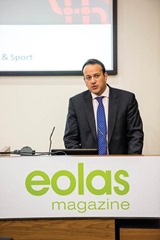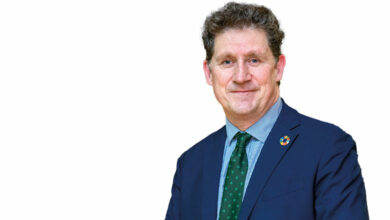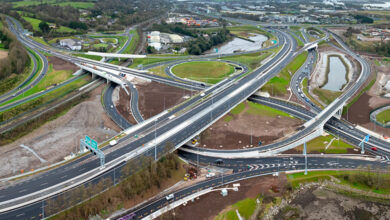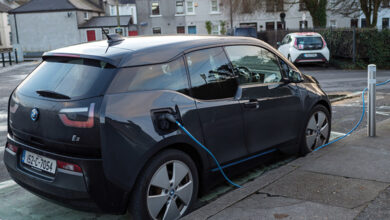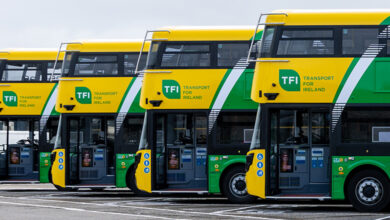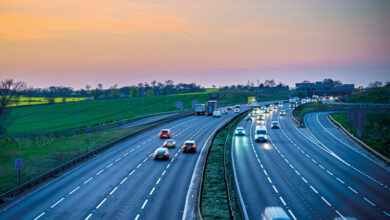Varadkar calls for capital boost
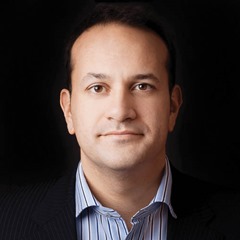 Addressing the Transport Ireland conference, Transport Minister Leo Varadkar has called for capital spending to be prioritised in the next Budget to boost the construction sector. Varadkar also reviewed the Government’s first two years in office and the main challenges facing transport in Ireland.
Addressing the Transport Ireland conference, Transport Minister Leo Varadkar has called for capital spending to be prioritised in the next Budget to boost the construction sector. Varadkar also reviewed the Government’s first two years in office and the main challenges facing transport in Ireland.
The 2014 Budget should focus on increasing capital spending rather than tax cuts, Minister for Transport Minister Leo Varadkar has stated in his first public comments on the promissory notes deal. Varadkar made the remarks in his keynote address to the Transport Ireland conference in Dublin.
“While tax cuts would be most welcome, particularly for those on middle incomes who end up paying high rates of income tax on modest salaries, we should not reduce taxes until we know that any reductions can be sustained into 2015 and beyond,” he stated.
He warned against using any “spare capacity” in the Budget to protect public sector pay and pensions and everyday spending. “Unpopular and difficult” decisions in those areas “need to be made and will generate long-term savings.”
Varadkar added: “Rather, we should use it to invest in jobs and growth. The most effective way to do this is, in my opinion, boosting capital spending. Investment in school buildings, health care facilities, flood relief works, roads [and] railways can create much-needed jobs and quickly if done through the traditional Exchequer route.”
Setting the context, he recognised that the two years since the general election had been “very difficult” ones. Unemployment remained “stubbornly high,” many of Ireland’s “best and brightest” were being lost by emigration, and families and firms were struggling to make ends meet.
The “backdrop of hard reality” made it easy to forget the progress made i.e. an increasing number of people at work (up 24,000 over 2012), controlling the deficit, restructuring sovereign debt on favourable terms, higher exports than in 2008, record inward investment and rising tourism numbers.
“When it comes to the banks, there is a long way to go,” he acknowledged. “Nonetheless, IBRC, Anglo Irish Bank, the promissory notes and the bank guarantee are now history, allowing us to focus on getting the banks back to the business of normal lending, profitability and ultimately their return to the private sector.”
In the transport brief, government achievements included:
• the separation of Shannon Airport from the Dublin Airport Authority;
• the decision to proceed with Luas Cross-City;
• the launch of the Leap Card; and
• a fuel rebate to assist the haulage sector and bus operators.
Varadkar added: “I am not saying this in an effort to blow my own trumpet but rather to thank my officials, political staff and the agencies and companies under my remit for their commitment, endeavour and loyalty in the last two years, and to recognise the part they played in achieving these things.”
Transport ministers previously “had very large capital budgets at their disposal, much of which was spent wisely and some not.” Varadkar had to “fight for every cent” and was therefore determined to get the maximum return from investment.
Capital funding for roads had fallen from over €2.1 billion in 2007 to €542 million in 2012 and two severe winters (in 2009 and 2011) had also taken their toll on the road network. Resources were therefore being concentrated on accident prevention and maintaining the existing network.
The Government, though, also announced an off-balance sheet stimulus package in July 2012 with over €1 billion allocated towards major transport projects using private finance e.g. the Newlands Cross/Rathnew bundle on the Dublin-Limerick N7.
Public transport funding from 2012 to 2016 will average around €260 million per annum. Luas Cross-City was the only key integration project but it “fills in one of the gaps in our infrastructure and helps to make Dublin a properly connected city.” The main construction works will commence in early 2015.
Business groups have claimed that construction could affect trading in the city centre but Varadkar said that he was doing “everything possible” to avoid that. He chairs the project’s stakeholder group, which includes business representatives. The Railway Procurement Agency and National Transport Authority were working closely with gardaí, Dublin City Council, Dublin Bus and local businesses on traffic management.
“I am confident that in 2017 we will all be very proud of this new service,” Varadkar added. “The Luas has been an enormous success. Passenger numbers have grown throughout the recession, proving that passenger numbers do not always track GDP, and it operates without subvention. Dublin is, without doubt, suited to light rail.” 4
Around €100 million will continue to be spent on railway safety after the current programme ends in 2013. The removal or upgrade of level crossings, installation of wi-fi and automated ticketing machines would “contribute to making the railway faster and more attractive to passengers.”
“I don’t have to tell you that there is no shortage of projects and programmes which could be funded if I had the money,” Varadkar added. The Minister regularly reviewed the list of potential projects and, in the short term, he wanted to have “a small number of shovel-ready projects so that we are ready to take advantage of any funding opportunities that may arise.” These should be affordable, have robust business cases and a positive benefit-to-cost ratio.
Cutting CIÉ costs
On the financial difficulties facing CIÉ, he noted that the scale of losses
(€137 million over 2009-2011) cannot be sustained. Reduced costs and headcounts had not closed the company’s deficit and the Government would not repeat the €36 million subsidy that it provided in 2012.
Irish Rail has introduced a voluntary severance programme and the group has generated €20 million by selling its interest in Spencer Dock. Passenger numbers and revenues have stabilised in recent months and negotiations with banks on re-financing were “progressing well.” It was “essential” that CIÉ continued to develop long-term plans to deal with its financial situation, with a continued focus on cutting costs.
Road safety was one of Ireland’s major successes. In 2012, 162 people lost their lives on the roads, compared to 396 in 2005. This was partly due to an improved primary roads network, higher standards and better maintained vehicles, the establishment of the Garda Traffic Corps and Road Safety Authority, and the introduction of lower drink driving limits and penalty points.
“However, the primary reason why Ireland has succeeded in reducing its road fatalities so dramatically is the change in the behaviour of road users,” he emphasised. “They, for the most part, have embraced road safety and in doing so deserve recognition for their actions.” The Government’s road safety strategy for 2013-2020 was launched in March and aims to reduce road fatalities to 124 or fewer by 2020.
Government would become a “more active, more demanding, better informed and more involved shareholder” in ports. The new ports policy categorises ports into those of national significance or regional significance, and replaces a previous one-size-fits-all policy.
A new aviation policy will be brought forward in 2014. The relevant consultation closed on 30 June and covers eight broad areas: airports; air services; regulation and governance; aircraft leasing and finance; aerospace; education and training; general aviation; and sustainability.
Varadkar, though, explained that this list is not exhaustive: “I have indicated that any and all submissions will be welcome and I encourage those of you with an interest to submit your comments before the end June deadline.” He planned to issue a draft policy statement by the end of 2013.
In conclusion, he pointed out that unemployed people with construction-related skills tended to be available for work but were finding it hardest to get work.
“Capital spending levels in Ireland are now very low and construction prices very competitive,” he reiterated. “I believe an increase in capital budgets could be very effective when it comes to increasing employment and improving the conditions for long-term growth and recovery. And that is an objective we all share.”
Long-term transport study outlined
A study into the Irish economy’s longer term transport needs is under way, the Minister revealed. When finalised, the Strategic Framework for Investment in Land Transport will outline the role that transport plays in the Irish economy and how it can contribute to the economy and society in future.
He commented: “The idea is to take advantage of the current lull in investment and construction activity in the transport sector, which has followed a period of very high levels of investment in the sector from the mid-1990s, to take stock and learn lessons from how we selected and implemented projects during that period.” The framework should be completed by the first half of 2014.
Decision-making in the transport sector has traditionally been linked to economic cycles. This has led to a long lead time for transport projects (which then fall down the political priority list) and short-term thinking (i.e. to relieve a pressing bottle-neck).
A longer term approach would allow ministers to consider “impacts which may not be so apparent in the short term,” including how transport can facilitate sustainable land use and more efficient public service delivery.
European transport priorities
Within Ireland’s Presidency of the Council of the European Union, Varadkar chaired the Transport Council, bringing together ministers from all 27 member states. Transport policy, he noted, is “a key driver” of the single market: “As an island on the periphery of Europe, we are only too aware of the importance of transport links that are fit for purpose.”
Varadkar was “really enthusiastic” about the Commission’s Clean Power for Transport Package, which was published in January and would commit member states to funding and supporting the development of electric vehicle infrastructure, and liquefied natural gas and compressed natural gas infrastructure for heavier vehicles and for ships at our ports.
“Of all the European laws being considered by the Council, this is the one that I can see making the most difference in 20 and 30 years’ time,” he stated. “We need to get serious about it and we need to get it right.” Ireland also sought to secure agreement on the Connecting Europe Facility for 2014-2020, the €23 billion smart transport fund and the Fourth Rail Package.

